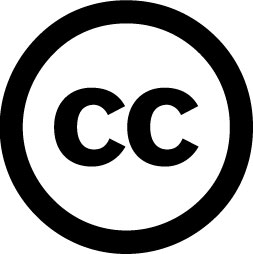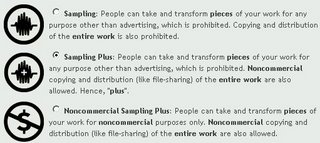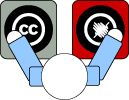Creative Commons
 If you’ve ever, in a bored 5 minutes, strayed from the main body of The Fly Wessex site, with its fantastic reviews and profiles, then you may have come across the ‘copyright notices ’ link in the lesser-visited ‘Information’ section of the site. If you’re anything like myself, the copyright page probably wasn’t high on your list of pages to visit, but if you had, then you would have come across the site’s ‘Creative Commons deed’. But what's it about?
If you’ve ever, in a bored 5 minutes, strayed from the main body of The Fly Wessex site, with its fantastic reviews and profiles, then you may have come across the ‘copyright notices ’ link in the lesser-visited ‘Information’ section of the site. If you’re anything like myself, the copyright page probably wasn’t high on your list of pages to visit, but if you had, then you would have come across the site’s ‘Creative Commons deed’. But what's it about?Traditional copyright law basically states that no artistic work, such as a music track, can be used in any way, shape, or form by another individual without the express permission of its creator, usually accompanied by a royalty fee. But, as has been widely publicised, this hasn’t exactly proved compatible with the modern Internet age in which people all over the world are ‘sharing’ music and other creative works. And that, in essence, is where Creative Commons (CC) comes in.
As with seemingly most things these days, the idea emerged from the US where some of the most high profile cases involving copyright infringement of music have occurred. Frustrated by the limitations of copyright law and its restrictive, nanny-like control that enabled corporations to hold all the cards over rules governing distribution of music and other creative works, a professor at the Stanford Law School set out to make his own set of licenses. His ideal was that these licenses would be used by musicians, and creators of other intellectual property, to take full control of their works, allowing them to state in advance if and how they are happy for their work to be distributed and used.
Old school copyright laws assume that the copyright holder wants full control over their works and, as such, would rule against its free-sharing without gaining explicit permission first. CC, on the other hand, realises that there are benefits to be gai
 ned from making work more freely available. It allows the creator to enter into a kind of negotiation with others where they set their own terms in advance. To simplify, think of it as the already widely respected concept ‘copyleft’. Whilst copyright states ‘respect rights, pay for use and give the creator credit’, copyleft states ‘respect rights, but you don’t need to pay, just acknowledge the original source’.
ned from making work more freely available. It allows the creator to enter into a kind of negotiation with others where they set their own terms in advance. To simplify, think of it as the already widely respected concept ‘copyleft’. Whilst copyright states ‘respect rights, pay for use and give the creator credit’, copyleft states ‘respect rights, but you don’t need to pay, just acknowledge the original source’.So how does it work?
Well, there are a number of different licenses available under CC, some of which are more directly suited to other forms of work, such as the sharing of scientific reports and computer coding. We can ignore those for now and concentrate on those that directly affect the main focus of The Fly: music. This essentially leads us to CC’s ‘Standard License’, which allows the artist to specify whether or not they are willing to allow commercial use and or modification of their work. There are two pre-prepared licenses – Firstly there’s the ‘Sampling’ license. This gives permission for people to take and transform pieces of your work for any purpose other than advertising. Secondly they offer a standard ‘Share Music’ license, aimed at the musician who wants to spread his music on the web and file-sharing networks, whilst protecting it from commercial use or remixing of any kind. CC is so flexible, however, that creators can pretty much mix and match their own rules to create a bespoke license that best suits their needs.
And as idealistic as this may sound, it’s already happening. CC is now being utilised by reputable artists the world over – indeed, household names such as the Beastie Boys showed their support with the launch of an album in association with Wired magazine. Brazilian music legend Gilberto Gil is another example of a man who has embraced the changes. Gil actively encouraged musicians across Brazil to experiment with his work in the name of producing more diverse and exciting music.

But couldn’t he have done that without CC? Well maybe, yes, but strictly speaking, under traditional copyright law, each re-mixer would have had to request his direct permission and pay him a fee every time they sampled his music, but with CC, he can say ‘don’t even bother asking, feel free to use it, just acknowledge me’ and, if he wishes, ‘but you can’t sell it on afterwards’!
However, it’s in relation to that same point that some of the main criticism of CC emanates. Some points of view are that it does nothing more than add complication to what can be quite a vague legal area to begin with. Why not just leave it as it is – black and white, rather than adding various shades of grey into the palette?
Well, for a start, the flexibility CC gives to artists is quite fantastic. In an ideal situation, it should mean wider exposure for new music. Bands can make their material readily available and sit back and watch while their popularity grows. The Arctic Monkeys did just that and managed to attain god-like status in the music industry even before the release of their debut album. And how many of the bands we feature on this website do you think rely on visitors, to their own sites or blogs, hearing their music as a means of widening their fan base? In terms of building a following, unsigned acts can benefit from CC by operating in the same playing field as artists signed to a label. It may even give them a competitive advantage because without the influence of a record label, CC can empower artists to come up with their own, innovative methods of pushing their music in the public domain.
Not that signed acts necessarily feel bound to the rules of their labels though. Selfish Cunt didn’t agree with their label’s scheduled release date for an album, so instead made all the tracks available on their website with a CC license. Like many bands, Selfish Cunt make their living from touring and gigs, whilst they see very little return from their records sales. So in terms of achieving their own objectives, CC is perfect.

"The more people who listen to us the better - maybe more people will then turn up to our gigs and make it more worthwhile for us. We prefer to have 400,000 file-sharers listening to our stuff for free than the 1,000 who paid $8 for our album. You can’t buy that kind of publicity for $8,000," the band told Henry Lacadaemon at h33t.com.
So what does CC mean for you? Well, if you are an artist and your motives are just to make music that people want to listen to, or build upon to create their own sounds, then CC could be the way forward. Indeed, even if your aspirations are a little more commercial and you dream of one day topping the charts with your own hit record, then the potential CC presents for achieving wider audience recognition could also be a useful step in the right direction. So check out the Creative Commons website to investigate which licenses best suit your needs.
If, on the other hand, you’re simply a music enthusiast, look out for the CC symbol whenever you’re downloading music. Click on the CC icon for instruction on how the artist wishes their work to be used so that you can rest safe in the knowledge you aren’t breaking any laws.
To see other features on the site navigate from the menus above.






